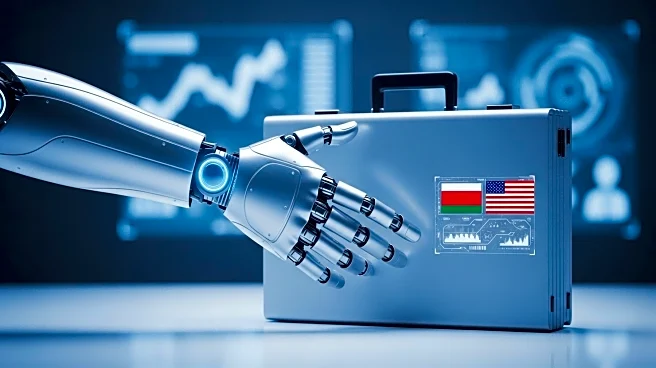What's Happening?
AI agents are increasingly being integrated into human resources (HR) functions, moving from experimental stages to more practical applications. According to Gartner, while many AI agent projects are currently in early stages, a significant number are expected to be canceled by 2027 due to high costs and unclear business value. The concept of 'agent washing'—where vendors rebrand existing technologies as AI agents without substantial capabilities—adds to the confusion. Despite these challenges, AI agents are projected to play a significant role in decision-making processes by 2028, with a third of enterprise software applications expected to incorporate them. Companies like Salesforce are developing frameworks to integrate AI agents effectively, focusing on redesigning workforce planning and reskilling employees.
Why It's Important?
The integration of AI agents in HR is poised to transform how organizations manage their workforce, potentially increasing efficiency and decision-making capabilities. However, this shift also raises concerns about compliance, bias, and the need for human oversight. As AI agents take on more roles traditionally held by humans, there is a risk of disengagement from learning processes among employees. The legal landscape is evolving to address these challenges, with regulations focusing on transparency and accountability in AI-driven decisions. Organizations that successfully navigate these challenges stand to gain a competitive edge by leveraging AI for improved productivity and innovation.
What's Next?
As AI agents become more prevalent, HR leaders will need to establish clear guidelines and objectives for their use, ensuring that they complement rather than replace human decision-making. Companies will need to focus on upskilling their workforce to manage and collaborate with AI agents effectively. Legal and compliance frameworks will continue to evolve, requiring organizations to maintain transparency and accountability in their AI applications. The success of AI agents will depend on their ability to deliver tangible business value, prompting organizations to carefully evaluate their implementation strategies.
Beyond the Headlines
The rise of AI agents in HR highlights broader ethical and cultural implications, such as the potential for bias in automated decision-making and the need for human oversight. As AI agents become more integrated into business processes, organizations must balance innovation with ethical considerations, ensuring that AI-driven decisions are fair and transparent. This shift also underscores the importance of continuous learning and adaptability in the workforce, as employees must develop new skills to thrive in an AI-enhanced environment.












